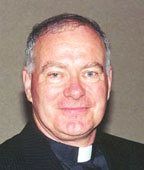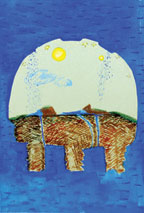Evolution or Creationism?
With our understanding of the universe today, how do we interpret the story of Genesis?
By Fr. John Carten, S.F.M.
March/April 2011
Return to Table of Contents
Print Article
Many times in recent years I have listened to groups of Christians demand that the teaching of Darwin about evolution be balanced by the story of creation. They seem to be saying that to be Christian one must believe that the world was created in seven days. I think some of these viewpoints present a negative image of Christians, as though science and religious belief are in conflict with one another and in order to be a faithful Christian we must put aside our intellect.
The inspired story of creation as it appears in the first and second chapters of Genesis was meant to teach us spiritual truths. It explained to us the who and the why of creation. Who created the world? Why was the world created? It was never intended to explain the how of creation. How did God bring about all that we see?
The inspired writers were limited, like us, in their knowledge of the world around them. The entire universe as they knew it seemed like a flat plate under an upside down bowl. The earth was flat and if you journeyed far enough you would fall off the edge. The sky was bowl shaped and appeared to be a solid firmament into which God placed the stars, the sun, and the moon. Below the earth and above the sky was water. When it rained, God opened doors in the sky and the water fell to the earth. The oceans, rivers, and springs flowed out of holes in the solid earth that allowed the water below to come to the surface. Then above the sky and the water that was above it, God dwelt in majesty, surrounded by the heavenly hosts.
This is the world that the sacred writers thought existed, and they put the activity of God into a seven-day cycle because the Jewish people of that time were living this seven-day cycle, including the rest on the seventh day, the Sabbath. Thus this explanation of God's activity made their seven-day cycle even more holy.
The unfolding universe
Today, the more scientists discover about the unfolding universe, the more people of faith can realize how wonderful and incredible is the power of God. The discoveries of science do not diminish God. They become a gift to help us understand the complexity and diversity of God's activity and grace.
In our lifetime, astronauts have left the surface of the earth and looked upon our home planet. Through the ingenuity of science we are able to look far out into the universe and learn about billions of galaxies with billions of stars in each galaxy. We have learned that not only our earth, but even the star that is our sun are far from the centre of the universe. The discoveries of scientists should make our awe of the majesty of God and of what God has done even more profound.
“As we grow more conscious of the expansiveness of grace, then the need for ecological responsibility and action is felt more deeply, urgently.”
Ursuline Sister Noreen Allossery-Walsh summed it up beautifully when she said, "The wisdom of science helps us to understand more fully the expansiveness of God's grace. Do we continue in the narrow perspec-tive of limiting God's activity to seven days or do we open up our hearts and minds to 14 billion years of God's creativity and unfolding grace."
If the sacred authors were writing the creation story in our age, they would be inspired to create a story that would describe the creation of the universe as we now know it.
In the end, there should be no conflict between the truth of science and the truth of faith. Both these truths are just reflections of the truth that springs from the heart of God and as such should be compatible.
Again quoting Sr. Noreen: "As we grow more conscious of the expansiveness of grace, then the need for ecological responsibility and action is felt more deeply, urgently. We understand more fully the intricacy of life, the vulnerability of our interrelatedness which needs to be preserved and maintained. Touching into and experiencing grace is not an end in itself. It has a purpose and horizon."
When all is said and done, for people of faith the truths of the Genesis story remain the same. God, out of love, is the creator of all that exists and what God created is good. Indeed it is very good.
Return to Table of Contents
Print Article

